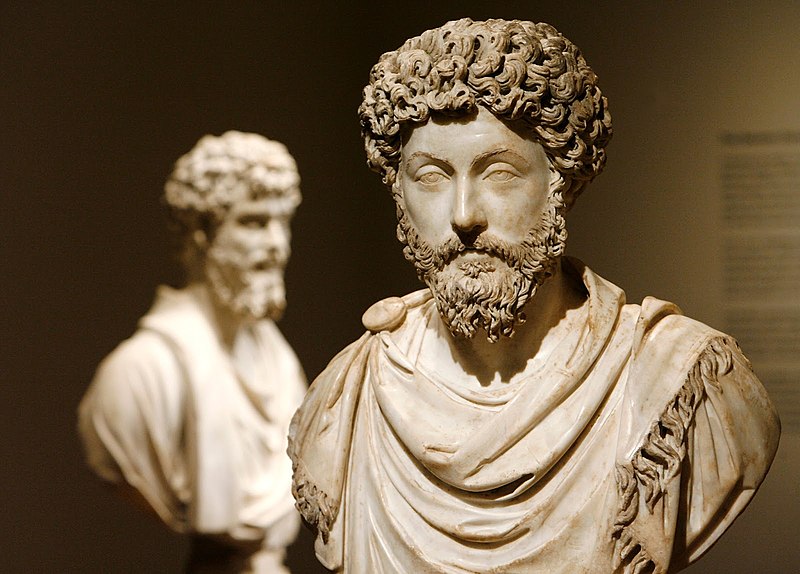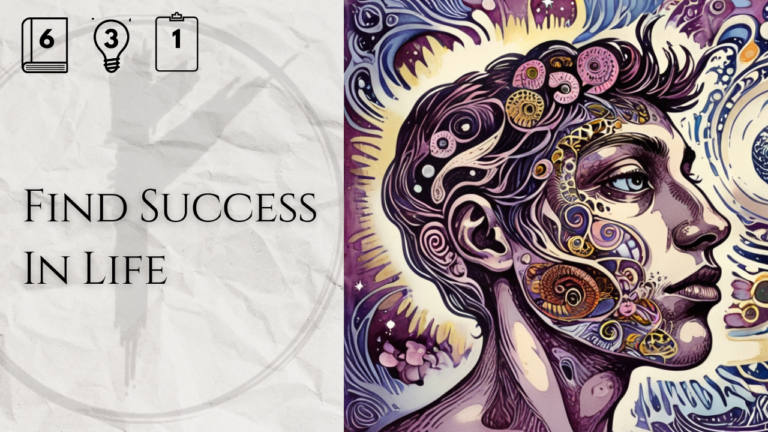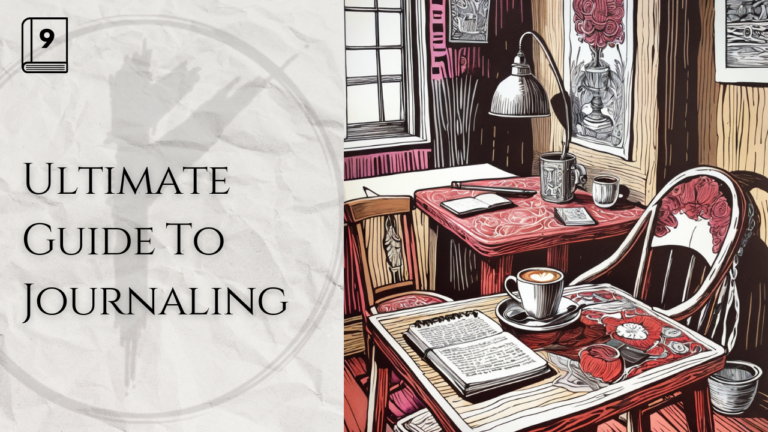Overcoming regret can be one of the hardest things to do.
I write those lines from experience, my friends…
First, it feels like a magnet that is hard to get away from, and once your thoughts come near it, it pulls you in and overwhelms you with more thoughts of regret. Followed by a lot of “what could have been?” – questions.
Then, it feels like a spiral, bringing you down to deeper levels. Hard to get out of.
And all of a sudden, you are in a bad mood and your day sucks…
In this article, I will share 4 things with you that helped, and still help me to deal with regret. I will mention a few books that I read throughout the last few months and years and what I discovered in those books. I hope you will be able to overcome regret.
And at the end of the article, I’ll give you the quote of the day.
1. Overcome Regret with Stoicism
Number one of the things that help me to overcome regret is stoicism.

Stoicism is an ancient School of philosophy and is more than 2300 years old. I find it very fascinating that people, thousands of years ago, dealt with the same personal problems as we do.
For example, obstacles that were in the way and they had to overcome, and I just find it so interesting to read their conclusions and solutions to deal with those problems, and we can only benefit from hundreds of thousands of years of wisdom.
Stoicism is getting more and more popular these days.
There are many good books that were written over the past few years and I will probably mention a few of them throughout the posts on dailyfriction.
It seems like it’s a very beneficial way to live your life if you follow the stoic principles and guidelines, and if you practice it. It’s not like you listen to it once, it clicks, and then your life is different.
You must practice stoic virtues and Implement them in your life as well as possible.
So one of the stoic main principles is called the dichotomy of control, which means that the stoics practiced differing between the things we can control and the things that we can’t control.
Outside events (pandemics for example) and how people react to us. We can’t control those things, right? So, why waste energy and feelings like regret over those things?
The past, and therefore also regret, is also one of those things we can’t control. It is outside our grasp. We can’t change it anymore. As long as there are no time machines, the past is written, in the book.
Done.
We can’t change it.
What we do have control over – and that’s the other thing that the stoics also talk about – is what we think about those things that happen to us and how we react to them.
The stories, we tell ourselves about those events and what will be the outcome of our life.
How will we deal with it?
And the stoics say we should actually focus our energy and our time on those things that we actually control and try to accept as well as possible the things we can’t control.
2. Annie Duke’s Book “Thinking in Bets”
Number two is Annie Duke’s book “Thinking in Bets”.
This is a very interesting book. And I especially loved the beginning of the book.
Sometimes when we read, we have those aha moments. It just clicks and we’re like, wow, I never thought of it that way. It changed your perspective on certain things, right?
And I had this experience with Annie Duke’s book because, at the beginning of the book, she starts by saying:
“Thinking in bets starts with recognizing that, there are exactly two things that determine how our lives turn out. The quality of our decisions and luck. Learning to recognize the difference between the two is what thinking and bets is all about.”
Annie Duke, “Thinking in Bets”
And then she goes on to explain that most people judge decisions by their outcome, which is a fallacy.
But that’s what really most of us do. We make a decision and if it turns out bad, we say that was a bad decision because the outcome is bad.
It is wrong to see it this way because there’s also luck involved.
Sometimes – and that was a part that got stuck in my head – our decisions are good, but then, bad luck, outside circumstances, other people, or events could happen, and then the outcome is terrible.
But nonetheless, our decision was a good one. Because we made a good judgment at that moment and it could also be exactly the other way around – we make bad decisions, but the outcome is good. And that’s why we don’t recognize our bad decisions necessarily.
Like drunk driving, for example.
It can be fine and we get drunk, we drive home, we arrived, and everything was fine, but it’s nonetheless a bad decision. It’s an unnecessary risk to take. And if something goes wrong, it’s really bad.
This principal told me in just a few lines to not condemn myself for good decisions, I made in the past that turned out bad after all.
And it’s very easy to look back and judge decisions by their outcome…
3. Death
Number three is death.
Death actually gets covered in stoicism as well, but I find it worth mentioning here separately when trying to overcome regret.
The reason is that if you think about death and the transience of life you will realize that nothing is worth regretting for the rest of your life, or even months and years from now, right? Because everything will end. And the things that you are feeling regretful for at the moment will vanish too.
As Naval Ravikant says, basically in three generations from now, you’ll be forgotten. That’s it. He says, in his book “The Almanack of Naval Ravikant: A Guide to Wealth and Happiness”:
“You’re born alone. You’re going to die alone. All of your interpretations are alone. All your memories are alone. You’re gone in three generations, and nobody cares. Before you showed up, nobody cared.”
Naval Ravikant, “The Almanack of Naval Ravikant: A Guide to Wealth and Happiness”
Later, he goes on:
“Anything you do will fade, it will disappear. Just like the human race will disappear, and the planet will disappear. Even the group who colonizes Mars will disappear. No one is going to remember you past a certain number of generations.”
Naval Ravikant, “The Almanack of Naval Ravikant: A Guide to Wealth and Happiness”
The stoics also talk about this. They call it “the view from above”.
You see the world and the universe, the past, present, and future.
You realize how little some of your problems are and some of your regrets and how they actually don’t matter. Because everything will come to an end anyway. So why would you waste so much energy and time on those things?
But it’s not just that. You’re actually wasting time. And this distracts you from being in the moment. In the here and now. And time is the only resource that we can never get back. So regretting is basically wasting time.
We can only take our lessons from what happened in our lives, but then we have to move on. Otherwise, we will waste this resource. We will waste time and there’s actually no point to it and in the end, things don’t matter.
4. Giving Things A Reason
Number four is giving things a reason.
The things that happened, those bad things that we feel regretful for – let’s give them a reason.
I don’t believe in the old saying that everything happens for a reason and that there is a big master plan behind everything that happens. No, I don’t believe in that. But many years ago, I already had the thought that…how about you take those bad things that happened and create something positive out of it. You give those things a reason.
Think of it like this: What would need to happen in your life now, that someday in the future, you will look back at that event and it will feel positive about it, instead of regretful?
Because something positive came out of it.
And again, the stoics also talked about this principle before and it was called “Amor Fati”, which means not just accepting your fate and what happens to you, but also loving it, which means, not just accepting, but making something good out of it.
Producing, something good out of it.
For example, if something bad happens to you, and you say okay this was sad, I can’t change it anymore, but…let’s stop smoking from this event on!
Take this event as the beginning of a new habit.
Or let go of that habit like smoking or drinking or whatever it is.
And so in the end when you stick to it and then five years from now or 10 years from now, you look back at the event and you don’t have this bad feeling anymore, because you feel okay, the event itself was bad, but you turned it into something good.
You created something good out of this. You embraced what happened and became someone better and stronger because of it.
Ryan Holiday says in “The Obstacle Is the Way: The Timeless Art of Turning Trials into Triumph”:
“We can see the bad things that happen in our lives with gratitude and not with regret because we turn them from disaster to real benefit – from defeat to victory. Fate doesn’t have to be fatalistic. It can be Destiny and freedom just as easily.”
Ryan Holiday, “The Obstacle Is the Way”
And also in “See you at the Top” by Zig Ziglar, he puts it in those words:
“A setback – regardless of the severity – can be a stepping stone and not a stumbling block.”
Zig Ziglar, “See you at the Top”
Conclusion
I hope that those four points help you deal with regret. And yet better, overcome regret.
They certainly helped and still help me.
It sometimes just needs a little shift in our thinking, other times it can be helpful to practice a new way of thinking or a certain kind of philosophy.
I want to end this article and the upcoming ones with some of my favorite quotes.
I will share them with you and tell you what I think about them.
Quote of the Day
So for this post, I picked a quote from an MMA fighter. His name is Frank Mir and he said
“You know what the true definition of hell is? It’s when you die, you get to meet the person you could have been.”
Frank Mir
I really like this quote, because it describes the feeling that you have toward the end of your life when you look at yourself and then imagine what you could have become.
There are certain decisions, habits, and fears, that could have been overcome instead of letting them hold you back. And things could have dramatically changed for you and brought you to another place.
Towards the end of life, we will all realize that with many things, there is nothing to lose after all, except things that we never experienced or that we never became.
It would probably be a brutal moment for most of us to see what was actually possible in our lives and what we became instead, on the paths of mediocrity and laziness.
I will leave you with this thought.
Have a wonderful day, my friends.







